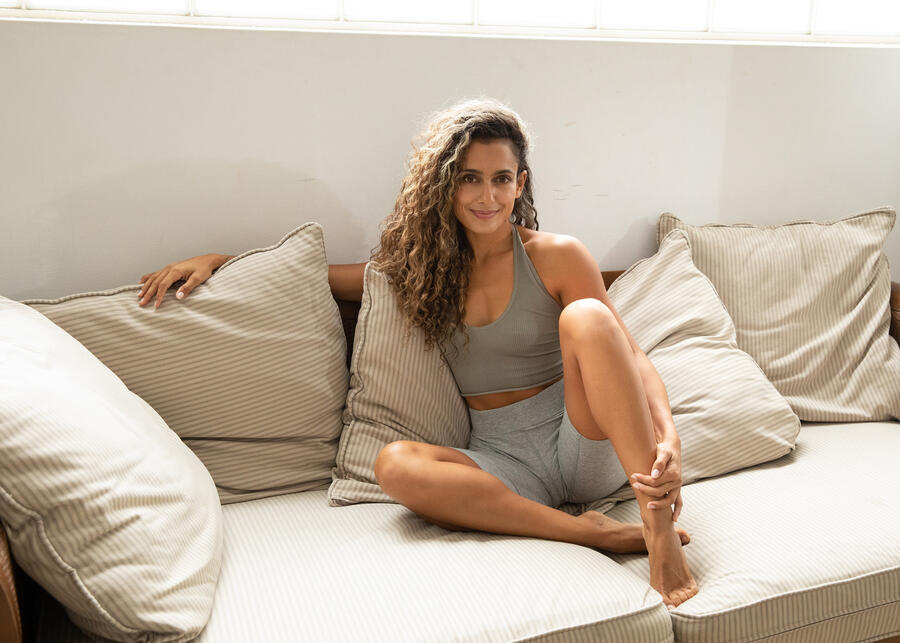
By Chloe Lawrance
This year, we're celebrating 25 years of Cowshed. And with that comes a celebration of all things wellness - it's what our range of bath and body care essentials offers, after all. As part of that, we hosted the Babington Wellness Retreat, a two-day event spotlighting everything that makes the House - which was the location of our very first Cowshed spa - the ultimate destination for rest and relaxation. For the duration of the retreat, guests were treated to a curation of wellness workshops and food, plus an exclusive Cowshed treatment, all in the heart of the Somerset countryside.
And who better to talk wellness with than Shona Vertue? A PT, yoga teacher and creator of the Vertue Method, she led the retreat's yoga workshop in a session that paid homage to the roots of the ancient practice.
We sat down with Vertue to discuss everything that Cowshed stands for: finding wellness rituals that work for you. Plus, she shared her tips for building - and maintaining - the ultimate wellbeing-boosting habits.


Tell us about the Vertue Method
'I was a gymnast growing up. But when I quit the sport, I started to experience some injuries. I thought yoga would help, but I actually found it exacerbated my issues. I loved yoga for the meditative aspects, and obviously flexibility was important, but I was lacking strength. It was when I took up weight training too that I started to heal my body.
'That's how the Vertue Method was born. It's an amalgamation of strength training and yoga. We often separate mindfulness, strength and cardio when we work out, but we should be balancing each of these areas equally.'

You incorporate a lot of the philosophical and cultural roots of yoga in your practice – why is this so important to you?
'For me, if you remove the Eastern philosophy from your yoga practice completely, it's not really yoga anymore. So, I try to integrate it in my teaching - it's incredibly beneficial. For example, a key principle in yoga is to avoid overidentifying with the body; this helps you to become less attached to the outcomes of your training and more attached to existing in the moment. Disconnecting from the body means your practice becomes more about how good it makes you feel, rather than getting a "bikini body".'
What does wellness mean to you?
'The concept of wellness has really changed for me. I've been asking much more: "what does it really mean to be taking care of my mental health?" I've been assessing how I spend my time each week - how much time am I giving to my relationships, to meditation, to exercise? These things that really make a difference to my wellbeing. We all add our work meetings to our diary, so why not these other key moments? I've started integrating this idea of scheduling in wellness-boosting activities as a priority; it's made me take a step back and really take stock of whether I'm taking care of all these areas of my life evenly.'

What does your morning routine look like?
'I'm definitely a morning person, so I wake up early - at about 5am. I try to avoid looking at my phone for the first 30 to 40 minutes of the day. Don't get me wrong, it's a slog, but I really do notice a difference when I allow myself a bit of time to focus on myself before anything else. I'll meditate for 10 or 20 minutes, drink some water, and take my probiotic. Then, I'll do some mobility work, before sitting down with my gratitude journal. It's cheesy, but starting my day by reflecting on everything I'm appreciative of really can change my perspective for the rest of the day. I just jot down five things I'm grateful for, and it means I can approach everything that comes afterwards with a better outlook.'
Do you have any tips for keeping up good habits?
'I think of habit building like building a campfire. You have to look at your motivations for that habit. For example, if you want to make regular training a habit, the initial motivation might come from making a change to your physical appearance. That's kind of like the kindling for your fire; it's not enough to keep it burning, but it's the spark to get it started. After a few weeks, you might be able to do a push-up or add more weights to your bar - that development is like adding some sticks to your fire. It helps it to burn bigger and for longer. Finally, down the line you'll find the major, long-term motivation - maybe that's realising your coordination has improved or your health has got better. That's the big log that keeps your fire burning in the long term.'
Discover more about 25 years of Cowshed













